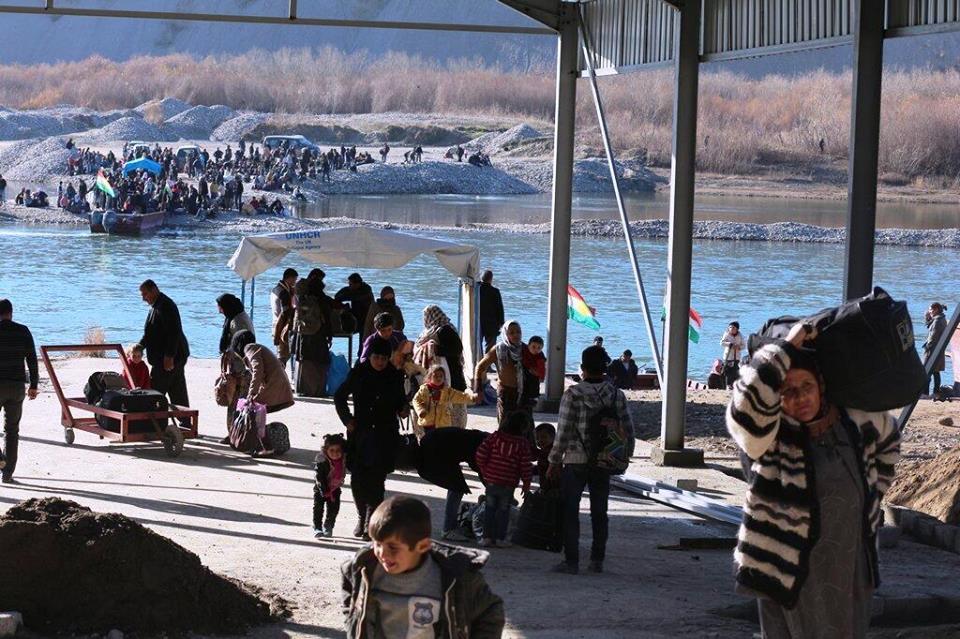Nigel Farage’s hypocrisy has upstaged Cameron over Syrian refugees
written for Conservative Home, 30 December, 2013

Syrian refugees cross the Tigris river to seek refuge in Iraq
The week before Christmas, I spoke separately to two Conservative ministers about the two million refugees who have fled Syria. These refugees aren’t benefit tourists, but people who have no functioning society to which they can even try to contribute. That 2.8 million people have seen their homes destroyed gives just a hint of the trauma engulfing a nation – the only way most of us can imagine Britain with 2.8 million homeless people is in a disaster movie like 28 Days Later. But this is real. And both the ministers I spoke to felt their government had a moral duty to take in a proportion of these refugees. But both, independently, expressed the same frustration: “and the reason we won’t, is b***dy Farage”.
Few people in the government are bothering to deny it. The single reason that the government has prevaricated about making visas available to Syrians – even as the delayed decision leaves thousands in tents exposed to the harshest weeks of winter – is their fear of stoking the anti-immigration backlash on which Nigel Farage builds his electorate. So it’s ironic that if the government hadn’t been so afraid of him, they’d never have left the humanitarian position as a vacuum for him to fill.
Farage’s new announcement that UKIP supports the rights of Syrians to asylum in the UK perfectly suits his quest to dispel UKIP’s image as the new nasty party. Yesterday, he praised the 1951 UN definition of a refugee, but he seemed to have a shakier grasp earlier this year, when he told the Evening Standard his Huguenot ancestors had come to England as “refugees, not asylum seekers”. (Note to Nigel: they’re the same thing). Given the government’s moral cowardice on this issue, it’s hard not to say fair play to him. But there’s no question that if it hadn’t been for his rhetoric on immigration over the last few years, there would already be survivors from Syria living in safety in the UK.
There will be many who wonder why Britain, barely out of a recession, should spread a safety net under people from a far away land. But from a selfish perspective, granting asylum to a limited number of Syrians is more economically sustainable than the huge amounts of aid DFID is currently pouring into the camps that have popped up in Syria’s border countries. Little of this money goes into building long-term businesses or education: instead, it covers the massive logistical costs of keeping people alive in the harshest of conditions. In Lebanon, a country with a natural population of four million now plays host to one million refugees. It’s a nation already close to cracking under its own political strains. So it’s impossible for Lebanon to smoothly absorb the homeless newcomers. And as one NGO worker recently complained to me, much British aid goes on paying the extortionate rents charged by Lebanese farmers who can suddenly name their price for a cold barn, or a patch of infertile ground on which to pitch a tent. Germany’s model, of letting 5,000 Syrian immigrants start a new life in a developed nation, makes far more economic sense.
As Melanie McDonaugh points out over at The Spectator, this can be a selfish theft of skilled workers: in a just world, perhaps, we’d be offering only temporary asylum before refugees went home to rebuild Syria. But Syria shows no sign of being rebuilt any time soon. And keeping refugees in limbo doesn’t help them put down roots, or start contributing to rather than taking from the Treasury. Who’d start a business if you knew you’d be kicked out back to Syria in a year’s time?
As I wrote on Conservative Home last month, 2013 marked the seventy-fifth anniversary of Kristallnacht. It was also the seventy-fifth anniversary of the Evian Conference, at which free countries decided not to open their borders to German Jewish refugees, effectively condemning millions of them to death. Many British diplomats were heroes, but plenty argued that refugees would be leeches on Britain’s economy. Syrian refugees aren’t fleeing anything as organized as the Final Solution. But like Germany’s Jews, many of them now know what it is to be simply unable to live in their own nation. It’s all very well to sit through endless ceremonies and mutter “Never Again”. But learning from history means applying its lessons even when the parallels aren’t exact – after all, they rarely are.
Against the condemnation of future generations, Nigel Farage doesn’t look so scary after all. There is no way that Britain could take even a majority of Syria’s refugees. But we can take some, and put pressure on our partners to do likewise. If the Cabinet had shown moral leadership on this issue, Cameron, and not Farage, would be earning the respect of voters this morning.




